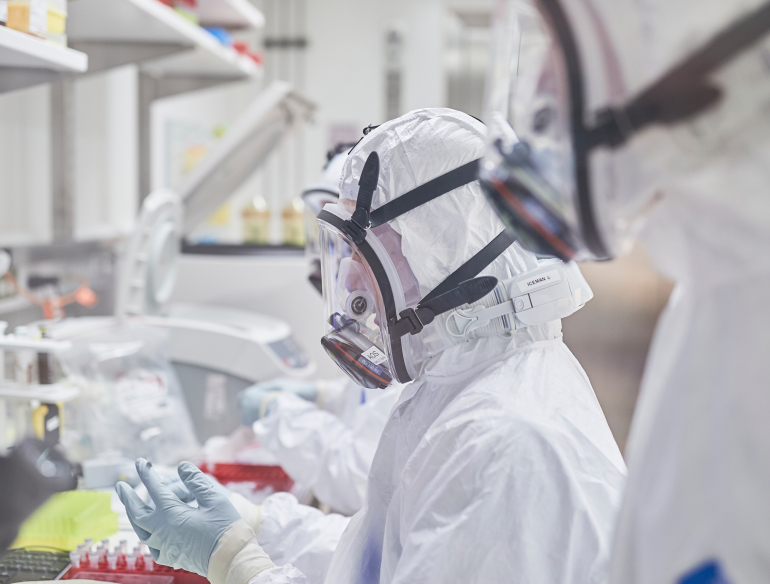A team of scientists at the UNSW RNA Institute, Garvan Institute of Medical Research and the Kirby Institute can now move forward to the next stage of developing a variant-proof COVID-19 vaccine, thanks to vital funding from the NSW government.
Written by Olga Gerloff for the UNSW Newsroom
The researchers are working on an mRNA vaccine that will be resistant to emerging variants of the SARS-CoV-2 virus, ending the need to modify booster shot formulas.
“The COVID-19 pandemic has so far killed at least 15 million people globally and caused chronic cardiovascular, lung, blood, and neurological complications in many more. It will not be over until we can prevent new variants of the virus from emerging,” said Garvan’s Professor Chris Goodnow, Chief Investigator of this research and Director of UNSW’s Cellular Genomics Futures Institute. “We’re addressing the urgent need for a COVID-19 vaccine that is variant-proof, preventing transmission of current and future strains.”
While the current COVID-19 vaccine options are safe and effective at reducing hospitalisation and serious disease, they have not succeeded in eliminating the virus. The challenge is that as the SARS-CoV-2 virus mutates into new variants over time, it becomes effective at evading the vaccines.
SARS-CoV-2 vaccines are developed reactively rather than proactively, meaning that while they do offer protection, the virus is one step ahead, leaving communities vulnerable to waves of new strains, like the Omicron subvariant XBB.1.5 already circulating in Australia.
UNSW Vice-Chancellor and President, Professor Attila Brungs, said the development of the mRNA vaccine will draw together UNSW’s existing world-renowned expertise in this area.
“We welcome this vital funding from the NSW government. We are proud of the collaborative effort between the UNSW RNA Institute, the Garvan Institute of Medical Research and Kirby Institute on the development of a universal COVID-19 vaccine that will have a profoundly positive impact on human health.”
How a universal COVID-19 vaccine will prime the immune system to recognise all variants
Current COVID-19 vaccines and most vaccines in development, such as variant-specific mRNA boosters, target sites on the spike protein of the virus that change as the virus mutates.
The universal vaccine will instead target parts of the virus that are not typically subject to change. These areas are important for the virus to survive, so in targeting them, it forces the virus into a corner. This approach is designed to prime the immune system to recognise all variants of the virus, preventing infection from not just current strains of COVID-19, but future strains yet to emerge.
The team has studied related coronaviruses to target these key stable sites. Having already demonstrated the underlying approach in cell studies, the researchers will now work on the vaccine formulation in animal models, testing strength and durability of antibody responses in comparison with the current gold standard mRNA vaccine. They plan to select a lead candidate to put forward for clinical trials by December 2023.
Funding presented under the COVID-19 Vaccine Acceleration Research Grant
The funding was awarded by NSW Health in the form of a COVID-19 Vaccine Acceleration Research Grant to support research conducted at Garvan, in collaboration with UNSW’s RNA Institute and the Kirby Institute.
“At Garvan, alongside our collaborators from the UNSW RNA Institute and the Kirby Institute, we are uniquely positioned with the expertise and the facilities to develop and test a safe and effective universal COVID-19 vaccine,” said Professor Peter Croucher, Garvan’s Executive Director (interim).
Director of the UNSW RNA Institute, Professor Palli Thordarson, said the Institute was established to accelerate RNA research and development. “This project is a great example of how teamwork can tackle important challenges – and there are few as important as this – a universal COVID-19 vaccine. Our role in this project will be to provide the research teams with high-quality mRNA and LNP materials at scale using first-in-Australia ISO 9001 certified RNA pre-clinical scale production facility.”
Professor Anthony Kelleher, Director of the Kirby Institute, said: “We’re thrilled to be working with the Garvan Institute and the UNSW RNA Institute to develop a universal vaccine for COVID-19. In our laboratories, we’ll be running complex tests to determine how well the potential vaccine works against a broad range of current and future variants of COVID-19.”
Other team members involved include Associate Professor Stuart Turville, Laboratory Head at the Kirby Institute, Dr Deborah Burnett, Group Leader at the Garvan Institute of Medical Health, and Dr Katherine Jackson, Senior Research Officer at the Garvan Institute of Medical Research.
